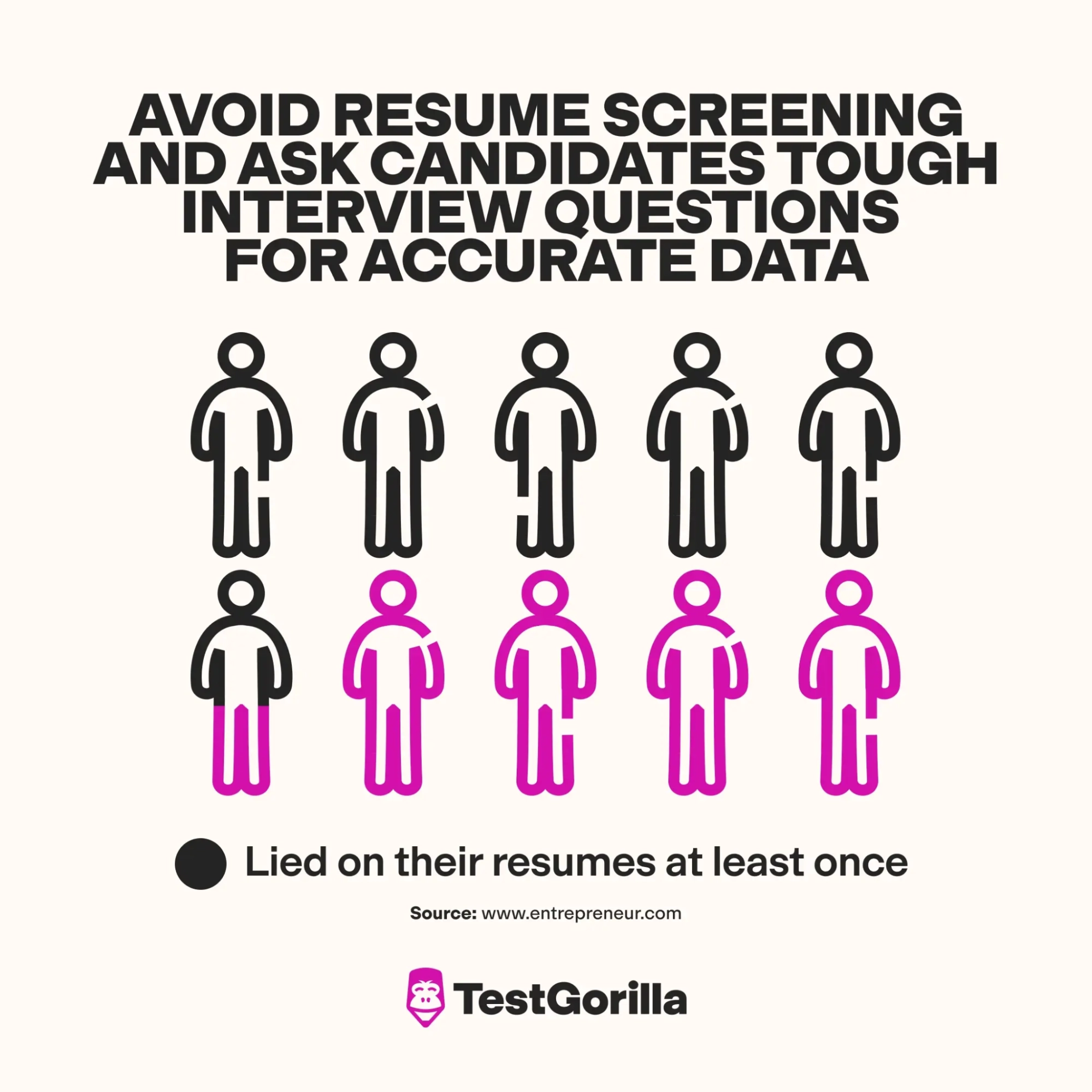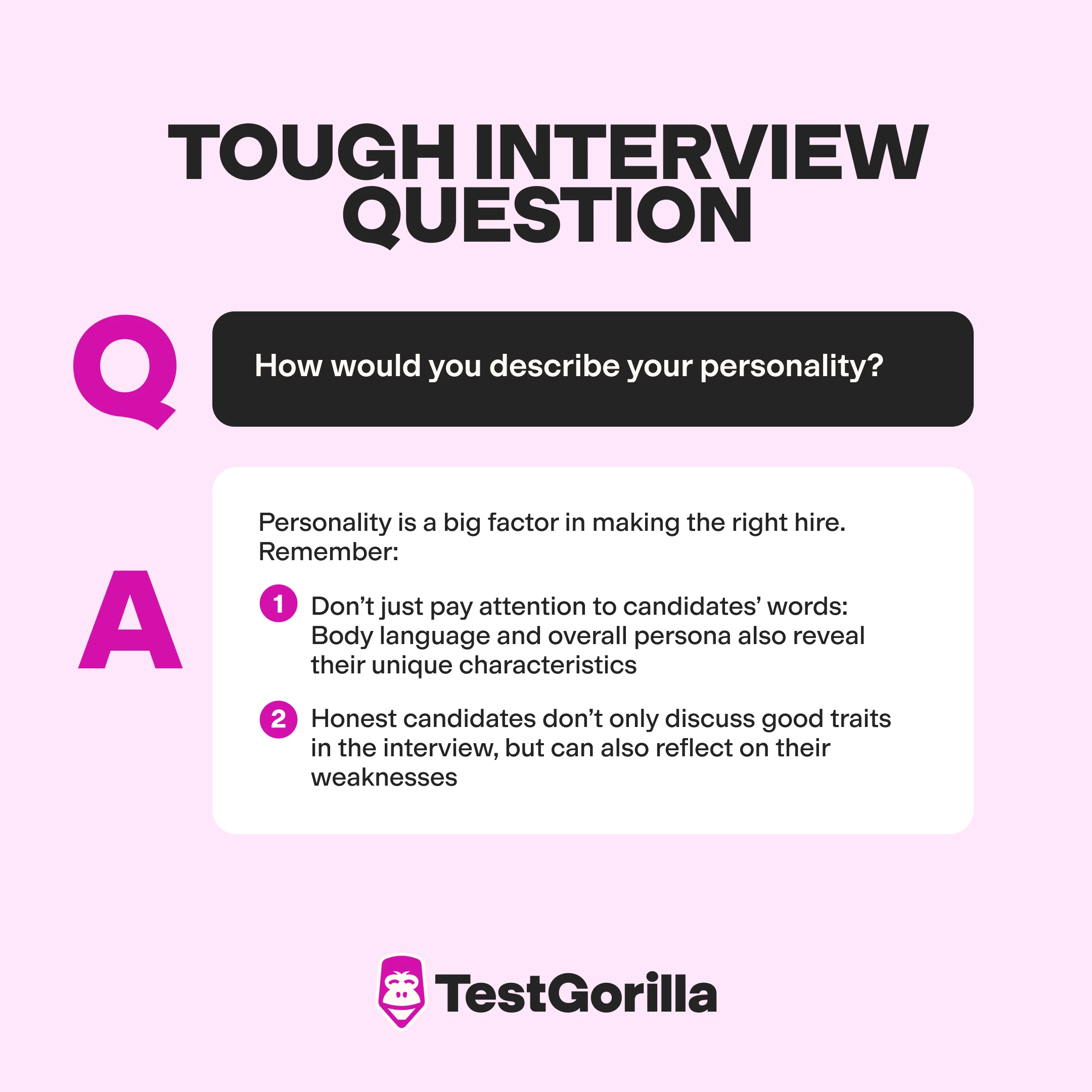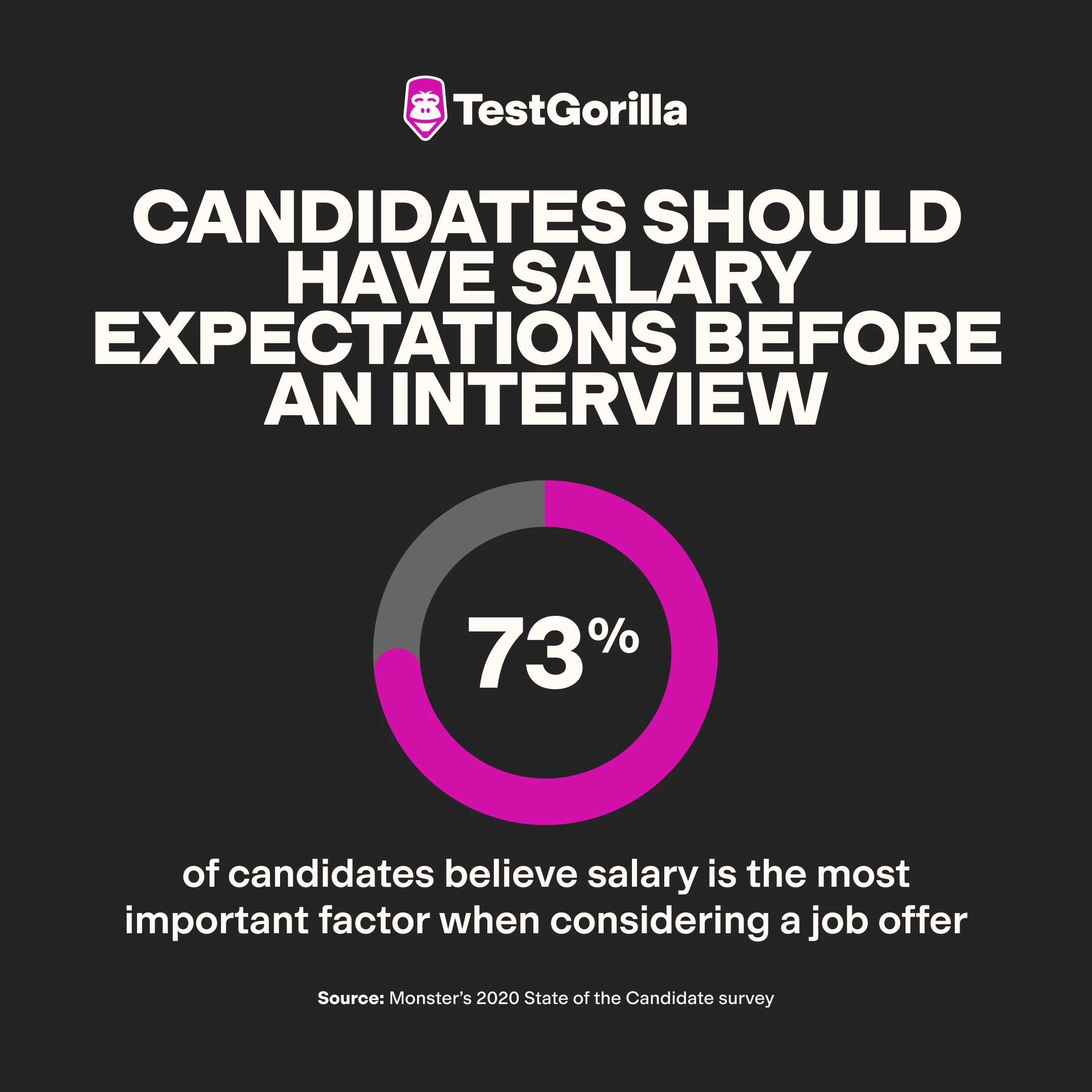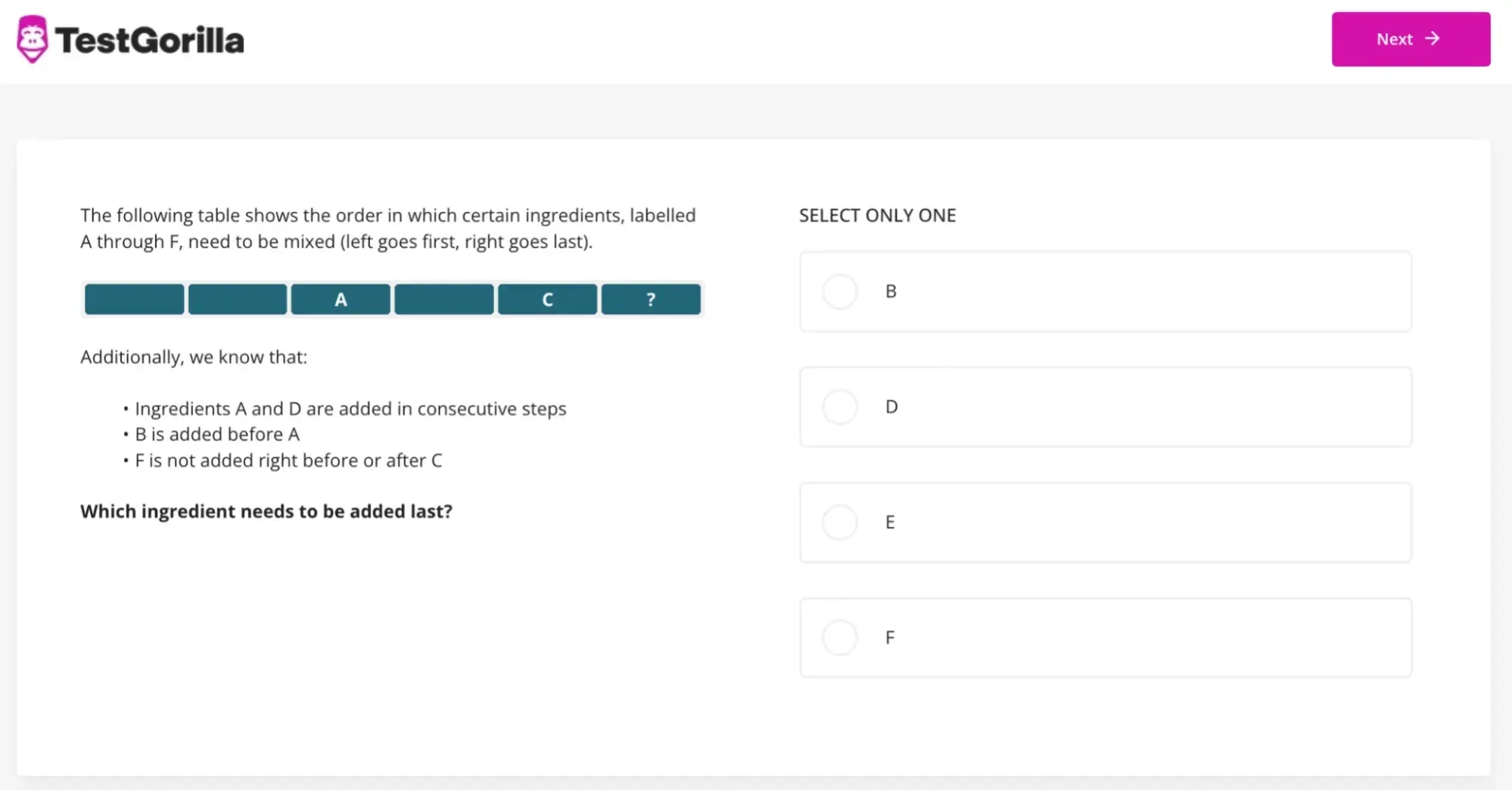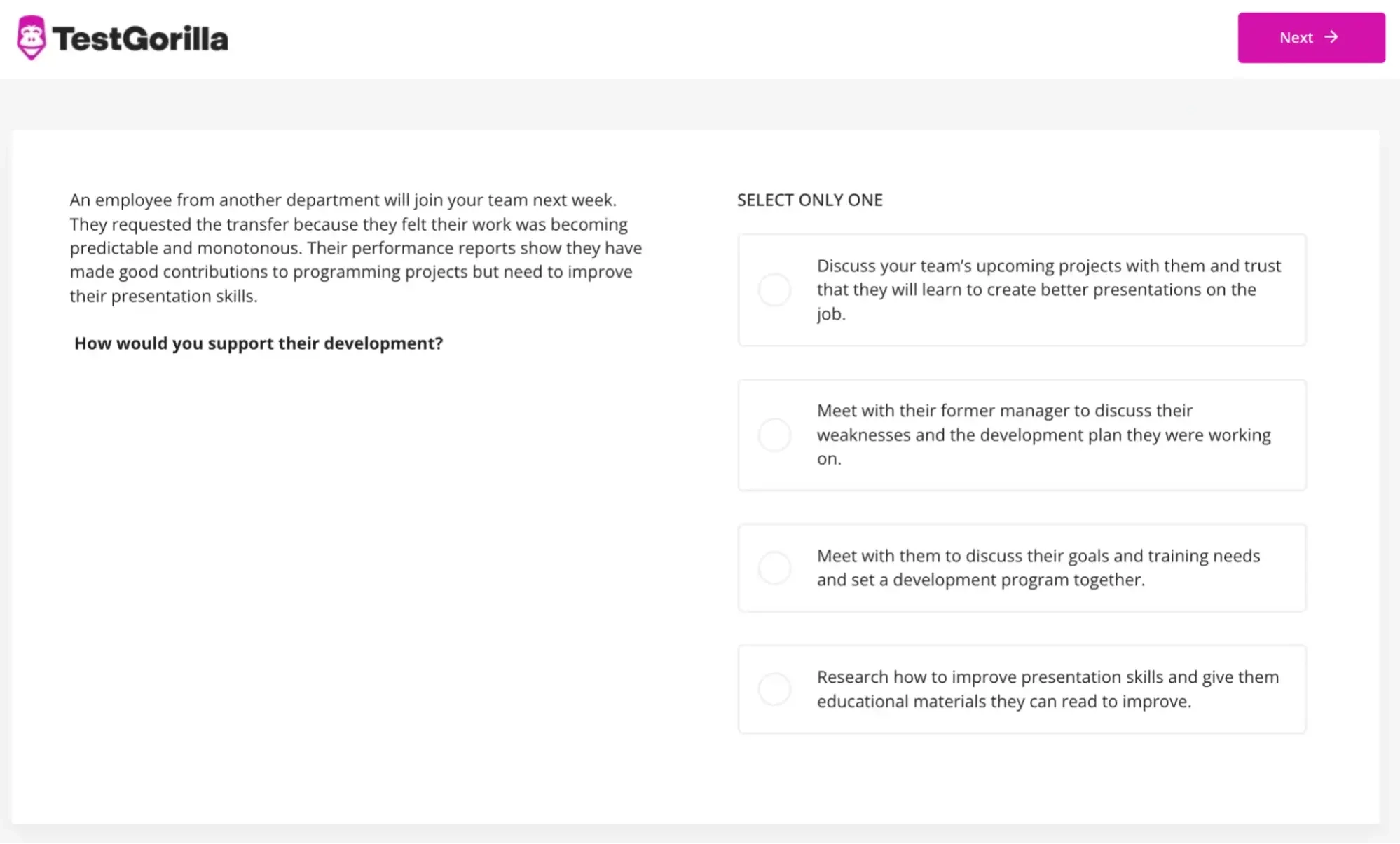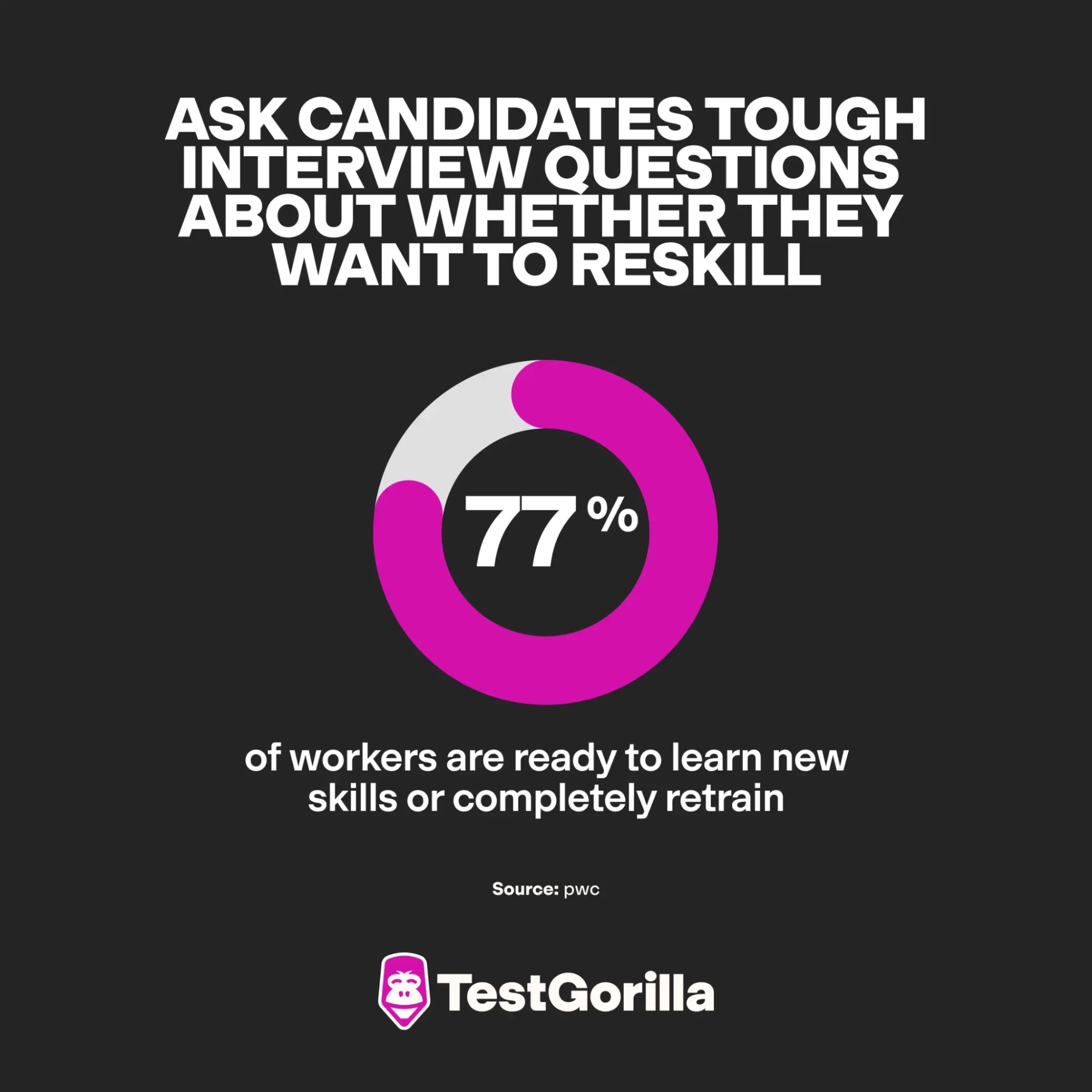25 tough interview questions and answers to help you hire talent
Invite only the best candidates to interview
Hiring managers want nothing more than for the interviewee sitting in front of them to be the right person for the job.
Tough job interview questions aren’t designed to catch candidates out for the sake of showing their weaknesses. Rather, they give them another opportunity to show their critical thinking skills in action. What’s more, job interview statistics show that candidates prefer difficult interviews.
These are less open-ended and require more creativity than common interview questions like “Can you tell me about yourself?” or “Why should we hire you?” They also help you dig deeper into the qualities you spotted in screening skills tests.
We cover 25 tough interview questions and answers to help you more deeply understand your candidates, then seven tips for answering tough questions candidates may shoot back at you.
Table of contents
The importance of tough interview questions
Difficult interview questions like these give you valuable insights into a candidate’s experience, personality, and thought processes.
Even abstract questions can be useful. A question like “If you were an animal, which animal would you be?” isn’t looking for a specific answer but instead judges if the candidate can answer quickly and back their logic with an explanation.
It’s not always about whether a candidate has a good answer, but rather observing their thought process when coming up with an answer.
To get a good sense of your candidate’s personality, behavioral interview questions are another great category you should use in interviews.
A tricky interview question like “Have you ever chosen to act outside your company’s normal policy?” tells you more about a candidate’s judgment and problem-solving skills than common questions like “What are your strengths?”
Take your time building your collection of tough job interview questions and form them into a structured interview so that you ask all of your candidates the same questions and reduce unconscious bias.
25 tough interview questions and answers
Using skills testing to screen candidates ensures all interviewees have the core skills for the role. This makes hiring more efficient, accurate, and objective – just ask our client Digital Care.
It also frees you up to focus on more qualitative questions in your interview instead of testing candidates on their knowledge of your industry. Here are 25 tough interview questions with some example answers to give you some inspiration.
1. Which piece of constructive criticism do you receive the most?
Candidates may struggle to be honest about their flaws, particularly ones they’re still working on.
The best candidates have the humility to not only share a useful piece of constructive criticism that has helped them to improve but also reflect on why it keeps coming up and how they plan to tackle it in the future.
For example, after receiving constructive criticism, they might try to improve their active listening skills to ensure they are receptive to their colleagues’ ideas.
The candidate may clarify that even though that’s their most common criticism, the frequency they’ve received it has steadily declined over the years as they’ve improved.
2. Can you tell me about your greatest weakness?
Learning about candidates’ biggest weaknesses can help you better understand their prominent personality traits. For example, being hesitant to make big decisions can be a sign of a cautious personality.
Questions like this are hard interview questions to answer, but they are worthwhile because they give you something resume screening can’t: a gauge of how honest candidates are.
Resumes don’t require candidates to list anything negative about themselves, and research suggests that 55% of candidates have lied on their resumes at least once.
3. What did you dislike about your previous job?
This is another of the toughest interview questions for candidates because it requires them to be honest and – just as importantly – constructive with their criticism. Candidates should understand the issues well enough to know how they might be improved.
What they disliked in their previous role can also help you understand if your role and organization would suit them or how you can adjust the role to better fit their strengths.
4. Why do you want to work for our company?
This tough interview question forces your candidates to think quickly and refer to the facts they have learned about your organization. This helps you evaluate their thought processes, preparedness, and critical-thinking skills.
Great applicants provide thorough responses to this question, likely mentioning facts about the open position and explaining how it relates to their professional goals.
Applicants might also mention the salary and new opportunities for progression.
5. What would you do differently if you could start your career over again?
Not every candidate is satisfied with every career choice they’ve made. If your candidate can explain why they regret past experiences or educational choices and how they’ve changed course, it shows they know what they want to achieve in their professional career.
Candidates who are open about their mistakes are more transparent and determined. They may talk you through each career step and how they would’ve made different choices to achieve more challenging goals.
6. What do you know about this company?
This is one of the tough interview questions to test your candidates’ knowledge of your company. A suitable candidate can provide facts and key information related to their research.
Candidates who don’t have information about your organization may have failed to research the company and lack the dedication to join your team. If you have specific and unique company missions, you need potential employees who understand them and want to be part of an evolving team.
7. Are there new industry trends that could benefit our company?
You may ask this tough interview question to determine a candidate’s ability to research industry trends and compare them with your company’s advancements.
Research isn’t compulsory, but a lack of insight into emerging trends may show the candidate isn’t planning a long-term future in your industry.
For example, the candidate could discuss artificial intelligence systems and how your company could use AI-powered chatbots to improve customer experiences. Linking trends to the open position indicates their level of expertise in their desired industry.
8. What technological advancements do you hope to see?
Another tough interview question to test candidates’ understanding of their chosen industry can ask about advancements that don’t yet exist.
It requires them to understand what technologies are already at work in the market and the key problems the industry faces that haven’t yet been solved by technology.
Their answer would both demonstrate their knowledge of what’s theoretically possible and their creativity in imagining how it would work in practice.
If your open position relies on knowledge of specific technologies, it’s also worth using software skills tests such as Microsoft Windows or Google Sheets to screen candidates.
Supercharge your interviews by screening for skills.
Find out how TestGorilla’s skills tests can maximize the efficiency of your hiring process.
9. How would you describe your personality?
Personality is a big factor in making the right hire. Remember:
Don’t just pay attention to candidates’ words: Body language and overall persona also reveal their unique characteristics
Honest candidates don’t only discuss good traits in the interview, but can also reflect on their weaknesses
Consider sending each candidate a Big 5 (OCEAN) test before interviewing them. This test evaluates five key aspects of personality: openness, conscientiousness, extroversion, agreeableness, and emotional stability.
Comparing their spoken answers with their test performance can tell you about their self-awareness and honesty.
10. What have you learned from your mistakes?
Everyone makes mistakes, and no candidate is perfect. Creating human errors in the workplace is also common, so candidates shouldn’t feel ashamed about past mishaps.
This question gives candidates a chance to think about their mistakes more broadly. They should still give specific examples, but look out for candidates who can draw broader insights about themselves, their way of working, or their role by looking at the big picture.
11. What was the most and least rewarding thing about your last job?
When considering how to answer tough interview questions like this, candidates should be honest about previous jobs and how those experiences benefited their career path.
Some candidates might give a quick answer if they didn’t enjoy their last role. Write down their responses to better understand their expectations and work preferences.
Be wary of candidates who mention that they dislike things your company offers. For example, if one candidate dislikes client meetings, a heavily client-facing role won’t work for them.
12. How much do you expect to get paid?
Questions about compensation can feel awkward, but they’re necessary. Candidates may have difficulty answering if they haven’t considered their salary preferences. Still, hiring job applicants who feel comfortable with their initial earnings is important.
Monster.com research suggests that 73% of candidates believe salary is the most important factor when considering a job offer. The ideal candidate should always have salary expectations before an interview and feel comfortable negotiating their wages for a new job.
13. How has your work experience prepared you for this role?
In the battle of skills vs. experience, skills come out on top. However, a great candidate can show how their work experiences from a past or current position instilled or sharpened their relevant skills.
For example, experiencing being short-staffed during a busy period might have forced a candidate to take on project management tasks.
They might then explain that this experience was a launchpad for them developing the project management skills they will use in this role – and that can bridge the talent gaps in your team.
14. Can you talk about when you had to resolve a conflict with your boss?
Conflict is bound to happen in any demanding job. Suitable candidates should have experience resolving conflict and maintaining professional relationships, especially with managers.
Candidates may use the STAR method to answer the question (and structure their response by giving an example situation, task, action, and result) to explain how they settled terms with their boss.
Candidates with great answers to this question may also recognize the different approaches that must be taken for conflict resolution depending on their boss’s management style.
You could send a Problem-Solving test like the one below to each candidate to evaluate their reactions to complex situations like this. This test also determines whether the candidate will successfully merge with your company culture.
15. How will you contribute to our team?
Great applicants should know which skills separate them from the pack based on:
What they’ve told them about the role in previous communications
The industry and job market
Feedback from current and previous employers
For example, a product analyst interviewing for a startup might say their main contribution will be their communication skills, which enable them to explain complex data tasks to employees without data analytics skills – a skill they know is essential and in short supply in startups.
16. How do you handle stress when the team has to meet tight deadlines?
Candidates who can manage stress are often highly productive. They know how to support their emotional wellbeing while getting tasks done. The ideal candidate should have measures that help them manage stress efficiently.
A big part of stress management when working to tight deadlines is time management skills. Candidates should explain how they manage their team’s time to minimize last-minute scrambling or unnecessary overtime.
Meeting deadlines in a team is also dependent on the candidate’s teamwork skills. How well can they efficiently delegate tasks between their co-workers? Can they work synchronously? You can also use the stress interview technique to assess how candidates perform under stress in real time.
17. What are you hoping to achieve in this role?
Every candidate should have a reason for applying for the specific role in your company, whether to lead innovative projects or put forward ideas that could enhance your company’s brand.
You should note candidates who want to grow in your company and improve their skills. This type of goal shows dedication to personal growth, which is something all teams need to succeed.
18. What do you look for in a manager?
Candidates may have preferences when it comes to management styles. They could have set ways for how managers should monitor them in the workplace and offer support.
Having preferences isn’t necessarily negative, but candidates should explain why they favor specific character traits in a manager.
For example, candidates could value:
Transparency
Active listening
Consistency
Trustworthiness
Write their responses down to see how their opinions align with your company.
19. How would you define success?
Success means different things to every candidate. For some, success is reaching a long-term goal after months of hard work. Others might view success as personal growth due to their consistent efforts. Some may even measure it purely on their income.
Look out for applicants whose vision of success aligns with your organization’s ethos and way of working. For example, if your company prioritizes innovative thinking, an ideal answer might be “creating a new solution to an old problem.”
Test candidates’ hard and soft skills quickly and easily.
Try out TestGorilla’s science-backed skills tests for free today.
20. Can you share some of your long-term career goals?
When workers feel passionate about their future aspirations, they want to boost personal progression to achieve them.
If their long-term goals align with your company’s objectives and the role they would take up with you, this is a good sign that they will work hard and be engaged with the role.
It also shows that they have deeply considered all aspects of the role and what they want to get out of it.
21. Are there any tasks that you dislike?
Candidates have preferences when it comes to completing tasks in a job. They should tell you honestly about what they don’t enjoy, which can help you determine which candidate suits the open position best.
For example, some candidates might not enjoy documenting their progress on computer software, and others may struggle with digital communication.
This question is important because it helps you narrow down your list of potential candidates based on whether they describe tasks that are either necessary for the role or that are potentially negotiable.
22. What is a mistake you made in a previous job?
The ideal candidate should talk you through one of their job mistakes and how they resolved it.
Candidates should explain the situation and what they did to prevent such mistakes from happening again – for example, after making a mistake in a pitch meeting, the candidate might avoid this happening again by enrolling in a sales master class.
You can also better understand their thought process when achieving personal development goals.
Learning from mistakes is essential for all employees; research shows that when people look away from their mistakes to protect their egos, they don’t learn from them.
23. What was the most challenging decision you’ve ever made at work?
Candidates’ responses to this question help you learn more about their personalities and how they might use leadership skills to make decisions in the company.
Challenging decisions may range from cutting expenses from the company budget to dropping a client who couldn’t collaborate efficiently with the team.
Consider giving candidates a Leadership & People Management skills test (preview below) to evaluate their coaching abilities and delegation skills. You can also use this test to hire potential leaders who can enhance your company.
24. What changes would you want to make in our company?
This tough question requires candidates to form their answers based on outside impressions, research, and what you’ve told them about the role and company.
They may name initiatives you’re already pursuing, but this could be a good thing, showing that their approach is similar to yours.
For example, your candidate may want to teach teams how to use the latest technical software. This positive change can help your company to digitally transform and speed up project developments.
25. How would you improve your current skills?
A recent survey found that 77% of job seekers are ready to learn new skills and develop the ones they already have. Constant self-improvement shows that candidates want to better themselves and obtain the right experience, skills, and knowledge for the open position.
You should question their current skills and how they developed them using previous jobs or personal training. Their responses can help you determine their capacity to continuously improve in a current job.
The best insights on HR and recruitment, delivered to your inbox.
Biweekly updates. No spam. Unsubscribe any time.
Summary of all 25 tough interview questions and answers
Short on time? Here’s a summary of all our tough interview questions and answers for managers and other employees:
Which piece of constructive criticism do you receive the most?
Can you tell me about your greatest weakness?
What did you dislike about your previous job?
Why do you want to work for our company?
What would you do differently if you could start your career over again?
What do you know about this company?
Are there new industry trends that could benefit our company?
What technological advancements do you hope to see?
How would you describe your personality?
What have you learned from your mistakes?
What was the most and least rewarding thing about your last job?
How much do you expect to get paid?
How has your work experience prepared you for this role?
Can you talk about when you had to resolve a conflict with your boss?
How will you contribute to our team?
How do you handle stress when the team has to meet tight deadlines?
What are you hoping to achieve in this role?
What do you look for in a manager?
How would you define success?
Can you share some of your long-term career goals?
Are there any tasks that you dislike?
What is a mistake you made in a previous job?
What was the most challenging decision you’ve ever made?
What changes would you want to make in our company?
How would you improve your current skills?
Bonus: How to answer tough interview questions from candidates
Interviews are a two-way street. The right candidate should evaluate you as an employer by asking questions the same way you evaluate them as a potential employee.
Candidates asking questions helps you:
Learn what the candidate finds important or exciting about the business and position
Identify prepared and motivated candidates
Take an opportunity to describe your organization and promote its benefits
Let’s look at how to answer tough interview questions from the recruiter’s point of view:
Tips for answering tough interview questions from candidates | Summary |
Prepare for tough questions with your team | Consider questions about why the position is empty, employee satisfaction, job responsibilities, company controversy, and more. |
Have someone else present at the interview | This teammate can provide additional first-hand insight and answers to your prospective candidate. |
Identify boundaries for your business and hold them | Transparency is encouraged, but make sure you know what you can and can’t disclose to interviewees before you begin – for instance, about upcoming projects. |
Research your organization’s processes | Researching your organization’s processes, history, and practices thoroughly prepares you for tough questions about the finer details. |
Know the role you’re offering and what you expect from candidates | Know the salary range, responsibilities, and challenges of the role, in addition to benefits and perks available. |
Know your company’s background | The toughest interview questions from applicants are about allegations, layoffs, unhappy past employees, and reviews on websites like Glassdoor. |
Be transparent where you can | Don’t try to hide the downsides of the role. Candidates appreciate your candor and support in making the right decision. It also reduces your chances of turnover if they accept the role without having been misled. |
Hire the best by combining these 25 tough interview questions and answers with top skills tests
In this article, we’ve gone through:
Why tough interview questions are important for finding the right candidates
A list of 25 tough job interview questions and answers to use in your next hiring spree
How skills testing can ensure you only invite the best candidates to experience your tough interview questions
To find out how skills testing could benefit your organization and inform which tough interview questions to ask, sign up for a free TestGorilla demo.
To see how our tests work and find out more about the platform, take a product tour.
Or, get started straight away by signing up for our Free forever plan today.
You've scrolled this far
Why not try TestGorilla for free, and see what happens when you put skills first.



